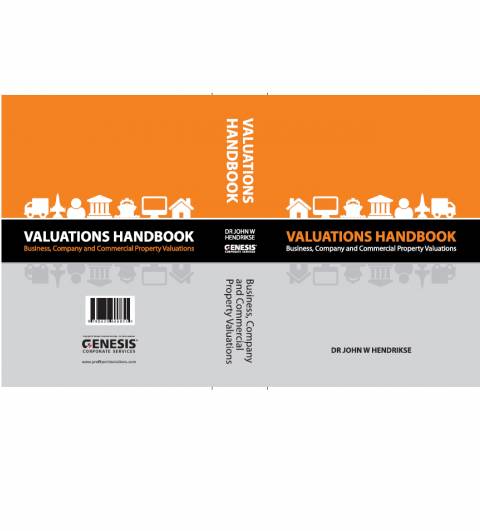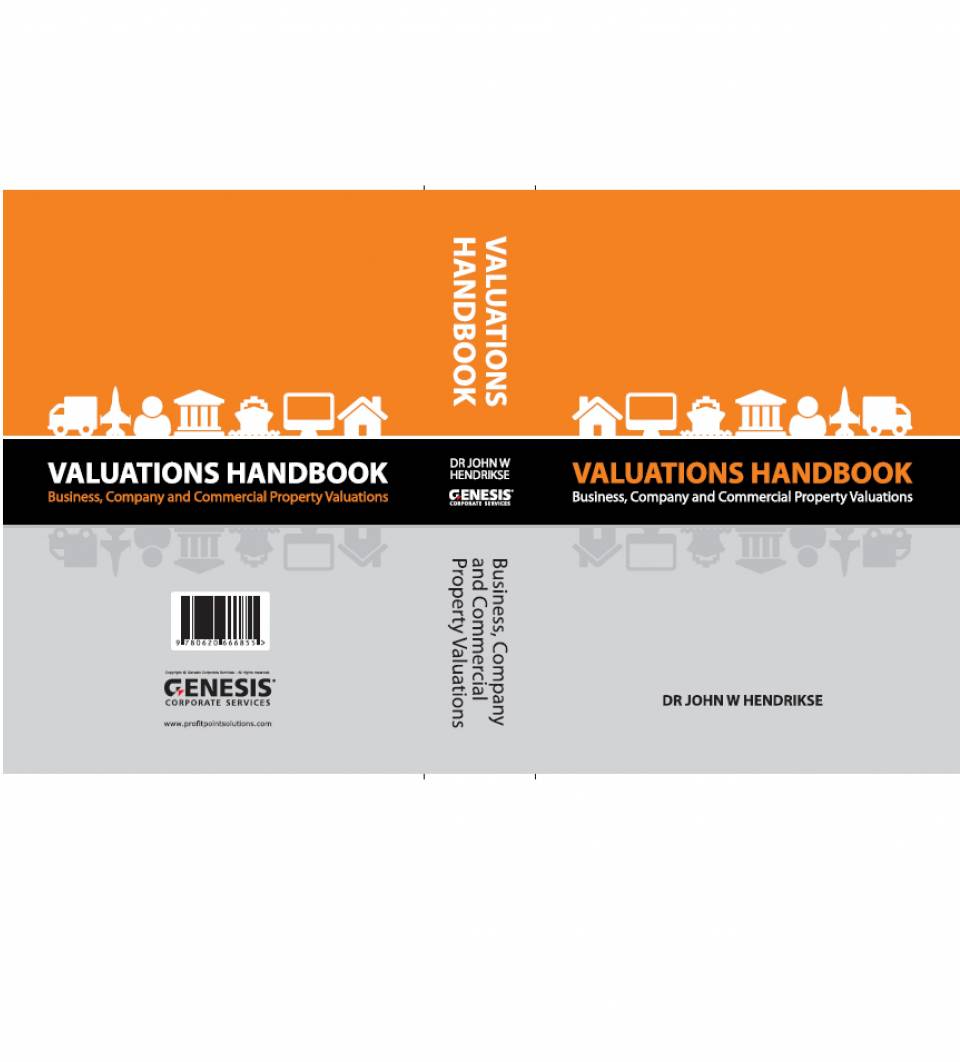Valuations Handbook E-Book
New E-book available!
Soft copy version with your logo / corporate profile at no extra cost to you for the artwork (no plain covers permitted)
Special til 30 Sept
FROM THE TEAM THAT BROUGHT YOU ONLINEBIZVALUATIONS
Author: Dr John W Hendrikse (B.Com., MBA. (cum laude), Ph.D), also the author of the Corporate Governance Handbook (JUTA)
Principles and practical concepts on business (enterprise and operations), brand and intellectual property, company (share and equity) and commercial property valuations.
Extensive definitions, examples and case studies and sample valuation reports!
Who is this for?
- Auditors, Accountants, Corporate Attorneys, Insolvency Attorneys, Business Rescue Practitioners
- Business Owners
- Professional Valuers
- Financial Planners
- Financial Managers and Advisors
- Property Practitioners
- Lecturers
- Students.
Chapters in the Book
Chapter 1: Importance of Valuations
Chapter 2: Principles of Valuations
Chapter 3: Capital Assets and Value
Chapter 4: Valuation Decisions
Chapter 5: Valuation Dynamics
Chapter 6: Valuation Techniques and Tools
Chapter 7: Valuation Approaches
Chapter 8: Valuation Methods
Chapter 9: Business Valuations
Chapter 10: Intangible Asset Valuations
Chapter 11: Listed Investments Valuations
Chapter 12: Limited Interest Valuations
Chapter 13: Company and Close Corporation Valuations
Chapter 14: Real Estate Valuations
Chapter 15: Special Cases
Chapter 16: Valuation Report
Chapter 17: Valuation Methods Formulae
Chapter 18: Valuation Documentation
Chapter 19: Valuation Glossary
Chapter 20: Valuation Agreements
Chapter 21: Capital Gains Tax and Valuations
Chapter 22: South African Companies Act and Valuations
Chapter 23: Valuation Standards and Guidelines
Chapter 24: Valuation Tables
Chapter 25: Specimen Valuation Reports
Some Key Questions Around Valuations Answered!
- What is the difference between an enterprise
- Valuation and an equity valuation?
- Should the valuation focus on past earnings or future earnings?
- What is the difference between cost of capital and cost of equity?
- How reliable are valuation multiples?
- Should one value on a post-tax or pre-tax earnings basis?
- What is wrong with the p:e multiple valuation method?
- What is the basis, justification and computation of economic goodwill?
- How does one determine the primary valuation method?
- How does one determine the company/business specific risks?
- How does a financial due diligence assist in valuations?
- How does the going concern impact on valuations?
- How important is the period of future earnings and whether the earnings is fluctuating or showing constant growth?
- What is the difference between the discount rate and the capitalisation rate?
- How does one calculate the expected rate of return?
- What are the fundamental differences in valuing a business from that of a commercial property?
- How does one convert an enterprise valuation into an equity valuation?
- What are expense items to consider in normalising and adjusting historical earnings?
- What is the most important value driver for any business?
- What are the main assumptions that forms part of the forecast earnings computations?
- Can a business with no assets have a value?
- What is the difference between the discount rate, internal rate of return and hurdle rate?
- What is the valuation platform and what are value drivers?
- What are the main financial indicators of value?
- What are the challenges of determining a credible valuation?
- Is loan from shareholders' / members' / partners' / owners' debt or equity finance?
- What are the main revenue/income items and expense Items that might require normalisation and adjustments in relation to
a) historical earnings and future forecast earnings
b) financial position items - What are the main valuation assumptions?
Special Features Included!
- New South African Companies Act and the Application of Valuations
- Solvency and Liquidity Test requirements and Valuations
- Business Specific Risk Calculator
- Simulated Examples including Business Valuation and Commercial Property Valuation Case Studies
- Valuation Due Diligence Checklist
- Discount Rate and Capitalisation Rate Tables for Commercial Property
- Valuation Formulae for different Valuation Methods
- Specimen Valuation Audit
- Business Valuation Audit
- Valuation Report Audit


Specifications
| B5 Size handbook | |
| ~ 800 Pages |